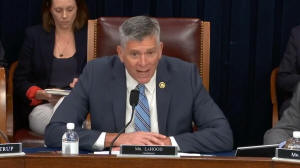|
According to the Government Accountability Office, an estimated
$100 billion to $135 billion was lost to fraud during the
COVID-19 pandemic alone. In Illinois, $3.2 billion was lost to
fraudsters.
“We want to learn how Congress can help rebuild and restore
confidence in the unemployment insurance program after the
turmoil of identity theft, fraud and claim delays during the
pandemic,” said Illinois U.S. Rep. Darin LaHood, R-Peoria, chair
of the U.S. House Ways and Means Work and Welfare Subcommittee.
California was particularly hit hard by fraud during the
pandemic.
“According to the Pandemic Response Accountability Committee,
California sent $800 million in pandemic unemployment benefits
to 45,000 prisoners,” said U.S. Rep. Michelle Steel, R-CA.
“Improper payments to prisoners, scammers and international
gangs are part of the reason California has a federal
unemployment insurance loan balance to the federal government of
$18.3 billion”
The U.S. House passed the Protecting Taxpayers and Victims of
Unemployment Fraud Act, which aims to strengthen the program's
integrity, recover lost funds and prevent future fraud.
LaHood said outside economic downturns such as the Great
Recession of 2008 and COVID-19, states routinely receive less
than half of federal tax revenues paid by employers to
administer the UI program.
“It’s clear that substantial amounts of tax revenue raised
specifically for UI administration is not ending up in the state
agency hands to enact needed system improvements,” said LaHood.
Witnesses during a recent Ways and Means Work and Welfare
Subcommittee hearing identified key areas ripe for reform in the
UI program to make it more efficient and accountable. These
include strengthening program integrity through identity
verification and upgraded technology, expanding reemployment
services to get people receiving unemployment quickly back to
work, and ensuring states receive funds intended to help them
administer the UI program.
|
|





